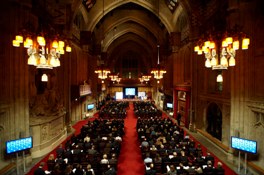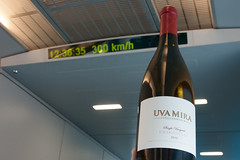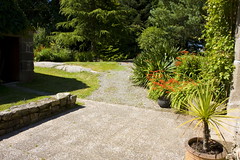WSET Diploma
A couple of weeks ago I attended a remarkable event in London’s Guildhall held by the Wine & Spirit Education Trust (WSET) to celebrate the graduation of this year’s Diploma students. Gathered together were 331 students and their guests from incredibly diverse backgrounds. There were students from all over the world, including China, the US, Canada, all over Europe and of course the UK. Under the carefully orchestrated direction of Ian Harris, the WSET Chairman, all students were presented with their Diploma scroll by Jancis Robinson MW, the well respected British journalist known affectionately in the trade as ‘Her Majesty.’ This was the culmination of years of study and a proud moment for all graduates.
I was fortunate enough to have done reasonably well in the exams and was awarded the UK Vineyards Association Scholarship. This is a fabulous reward for all the hard work of the last 2 years and will involve me getting stuck in to work at various vineyards and wineries around the UK. Pruning, harvesting, fermenting, competitions and tastings are just a few of the activities that I’m looking forward to over the next 12 months.
The WSET is the foremost authority for wine education in the world, based in London, the WSET was established in the UK in 1969 and has since expanded to 56 countries around the world offering courses in 17 different languages. With courses for the novice right through to Diploma level, there is a course for any level of knowledge that you may wish to aspire to.
Initially designed as qualifications for the trade, there is now a significant number of non-trade candidates at all levels. The trade qualification offers a more comprehensive and structured approach than wine appreciation courses. The qualifications are also internationally recognised and have become the de facto standard for wine knowledge worldwide.
My personal journey began in 2006 when I decided that I really ought to learn more about the delicious wines that I had begun to enjoy. Starting with the intermediate course I was soon learning about the many different wine producing regions of the world, how wine was made and what to look for when tasting it. The intermediate level course was very straightforward and just served to whet my appetite for further study and of course more tasting.
I immediately enrolled on the Advanced course and it soon became clear that a significantly deeper understanding of the world of wine and spirits was needed. Grape varieties that I had never heard of, soils, viniculture, were all subjects that I had to master. I had to build up a whole new vocabulary for what I was tasting in the glass, identify fruit flavours, comment on acidity, sweetness, tannin and body. A greater appreciation of what went in to producing a bottle of wine developed over time and it was amazing how quickly I began to identify specific characteristics associated with wine from certain regions or grape varieties. Passing the exam with distinction, was clearly a spur to take my studies further and enrol in a Diploma course.
The Diploma is the WSET’s highest level course and is considered to be a pre-requisite for enrolment in the MW (Master of Wine) course. The course is broken down in to various modules:-
- Viticulture and Vinification,
- Fortified Wines,
- Sparkling Wines
- Spirits
- Light Wines of the World
- The Business of Wine
There is also an essay assignment of 3000 words that has to be undertaken on a topic set by the WSET, the topic for my course being ‘The Premiumisation of White Spirits’ which, if you are truly bored, you can read here – Diploma Assignment. All parts of the course have their own exam which must be passed to qualify for the Diploma. The volume of studying is enormous and would have been extremely difficult to manage had it not been for the comprehensive guidance of Michael Palij MW of Winematters who was our course tutor.
Michaels’s prime task was to prepare us for the tasting exams that were to come in 4 of the units, sparkling wines, fortified wines, spirits and light wines. The WSET have a very rigid format for assessing wines, there’s none of the pretentious flowery language we’ve all heard from all manner of wine ‘experts’. Various components of the wine have to be assessed and written about precisely. Colour, aroma, sweetness, tannin, acidity, alcohol level, flavour characteristics and quality formed the basis of assessment of every glass of wine I was to drink over the following 2 years. It was important to learn how to assess a wine quickly and efficiently without missing out any vital observations.
Presented with 12 wines served completely blind in a tasting exam, it was a case of being disciplined enough to write down your observations calmly and quickly without trying to second guess the examiner. Making a rushed decision on what you think the wine is before properly evaluating it is a sure route to failure. Accurately describing the wine, even if you had no idea what it was, always gained the most marks. There were actually very few marks given for correct identification.
Tasting may have been the most enjoyable part of the course but there was still another 50% of the marks awarded for written exams and these required significantly detailed knowledge on all aspects of wine. The only way to manage taking on the volume of information was to be constantly immersed in the subject. It was a rare day during the 2 years of study that I didn’t pick up a book on wine at some point, there was just so much to read and to take on board. The complete syllabus can be found online on the WSET website here so I won’t bore you with the details, suffice to say that you may as well just describe the syllabus as ‘Wine, everything you can possibly think of and more!’
Daunting as it seems, the course is modular and this helps to break up the immense workload. However, what makes it easier is the constant discovery of new wines and the fascinating nature of the subject. The world of wine is an endlessly changing, living entity. Every vintage is different, techniques and influences continually change and evolve. There is a rich and aristocratic history but at the same time there is a breathtaking discovery of new regions and the opportunities they present. The old world is constantly challenged and has to adapt but must also remain faithful to the terroir that has served them well for centuries. To appreciate the intricacies and expression of the liquid in your glass, it is necessary to at least begin to understand some of the history of that wine, how it was made and why it tastes as it does. The WSET Diploma helps you along the road to that understanding and I cannot recommend this qualification highly enough.
I should also say a big thank you to my fellow course mates who came from remarkably diverse backgrounds and occupations and who all contributed to the enjoyment of the course. It was a pleasure to study (and drink!) with all of you.
Links:
WSET – http://www.wsetglobal.com
Winematters – http://www.winematters-oxon.co.uk/






















Congratulation! And thanks for this blog post! I’m considering undertaking the Diploma course and part of we says this is what I want while the other is saying that this means 2 years of my life taken away. If you have to estimate number of hours needed to study, what would it be? I still work 40h per week in the IT area, so I wonder if I can handle all the studying 🙂 Cheers!
February 18, 2017 at 11:12 pm